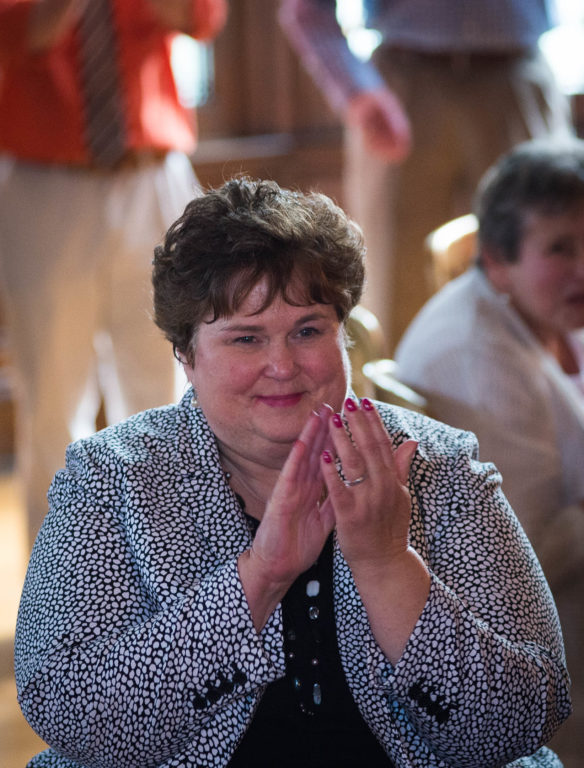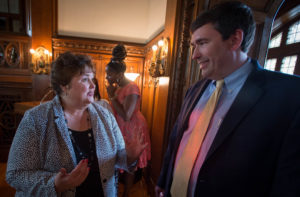
Mary Ann Blankenship applauds a speech given during a dinner marking her retirement as executive director of the Kentucky Education Association. Blankenship held that position for 11 years and spent 35 years working for education associations.
Photo by Bobby Ellis, April 19, 2016
By Mike Marsee
michael.marsee@education.ky.gov
It has been a long time since Mary Ann Blankenship was a classroom teacher, but she has spent most of her professional life working for them and the students they serve.
Blankenship retired April 29 as executive director of the Kentucky Education Association, ending a career in education that included more than 25 years with KEA and 35 years with education associations. She served as executive director of KEA for the last 11 years, and she said she feels the time is right to step aside.
“I feel like we’ve accomplished a lot working together, and it’s time to hand it over to somebody else,” she said. “And I’m also at an age where it makes sense.”

Mary Ann Blankenship talks to Kentucky Education Commissioner Stephen Pruitt at her retirement dinner. Blankenship said KEA has a strong relationship with Pruitt and the Kentucky Department of Education.
Photo by Bobby Ellis, April 19, 2016
Blankenship has been succeeded at KEA by at Mary Wheeler Ruble, who had been an assistant executive director with the organization since 2010.
Blankenship and her husband will relocate to Richmond, Va., to be near family, and she said she hopes to get involved in volunteer work.
During her final week at work, she answered these questions:
Are you leaving KEA in a good position?
“I feel like we’ve really built a lot of good partnerships. Our work with the Kentucky Department of Education, especially, has been very gratifying. I think we’ve got the relationship with KDE in a really solid place, and with what we affectionately call the alphabet groups and the Pritchard Committee and the legislature.
“I think I’m leaving KEA in good shape. Our membership is growing, financially we’re in good shape, and I think we’re well respected and thought of as an important representative, particularly for teachers.”
Where do KEA members stand compared to when you became executive director?
“Sadly, salary-wise they haven’t made much progress. I think pensions are in better shape than they’ve been for a while with the General Assembly and the governor’s funding of pensions in this session.
“I think teachers are widely regarded as being crucial to any kind of change effort that needs to be made in schools. Ten years ago, some people thought that that they needed to do school improvement around teachers and to teachers as opposed to incorporating teachers in their work. I think we’ve realized that unless teachers and their organization are included in creating the change, it’s not going to be very successful.
“There’s lots of talk about teacher voice and teacher empowerment, and I think that’s really helpful. I think we haven’t yet figured out what that means or how to make it happen. The good thing is most people realize that’s something we need to work on.”
Is this a good time to enter the teaching profession?
“I think it’s challenging. I think public opinion polling and policymaker polling is slowly realizing the centrality of supporting good teaching, so I think that’s really going to help drive a change for the profession. With that said, the economics of teaching still don’t look very good. For the next two years, again, there’ll be no raise. Since 2008, I think there have been two years when there was a state-mandated raise. And school funding is flat, which means not only are teachers economically not in very good shape, but also what I hear from almost all teachers is how much of their own money they spend in the classroom.
“I’m really excited about Commissioner (Stephen) Pruitt’s deep examination of our assessment and accountability system, because the pressure that comes with the accountability system. So I’m hopeful that when the state changes its assessment and accountability system that it will be a little bit more humane, both for students and for teachers.”
What would KEA like to see in that system?
“I think what we would like to see is assessment that is more comprehensive of all areas of the curriculum. Make sure that the arts are valued, make sure that all the basic curriculum areas are valued, make sure things like physical activity, those kinds of things are valued. We don’t necessarily support throwing program reviews out because that might have unintended consequences, but that certainly should be a little less onerous.
“The hard thing about accountability is that teachers would like to have everybody held accountable: parents, policymakers, school board members, legislators as well as themselves. That’s tricky to figure out how to make it happen.”
How did education fare in the most recent session of the General Assembly?
“Overall, education comparatively fared pretty well. I hate to complain, because there are certainly functions of state government that have been decimated over the last eight years while education has been held more or less harmless. But when you consider the increasing needs of students and what inflation has done over the last eight years, it really amounts to less money to spend for more needs. We’re grateful not to have P-12 cut, but it’s not the same as meeting the needs of kids in the classroom.”
What will the priorities be for your successor?
“One of main responsibilities with this job is maintaining all of those external relationships. My successor has some of those relationships already, and I think nurturing those relationships is going to be important. KEA always prefers to work collaboratively with people.”
What is the biggest difference in KEA since you started?
“Just the speed of communication and the fact that people email you and if you haven’t answered in an hour they think you’re ignoring them. And any more, email’s not enough; most of the members of our board of directors just text me.
“It’s also challenging because whether it’s the Department of Education or a school district or KEA, there was a limited number of sources of information that educators had available to them. For organizations, some of what our stock in trade has traditionally been is a good source of information. I think it’s more challenging to show people why they need an organization – our organization or KDE or anybody else – because they all think they can just make their way without any intermediaries.”
So why is KEA still valuable to teachers?
“The thing that I love about KEA is we are very clear about who we work for, and that is our members. I do think educators still need us because we are the only organization that has an unadulterated focus on them.
“Another thing is that it’s interesting to hear so many people now talking about teacher leadership. Our organization has always been led by teachers and we’ve done a lot of leadership training, a lot of promoting people and giving them skills. We are much more engaged in helping educators be better at their jobs as well as having job security and economic security.”
Did you ever see yourself doing this type of work for 35 years?
“No, I really didn’t. My path here really came from wanting to make a difference.
“It’s been great. I’ve said to many people over the last 11 years that I had the best job in the universe. And the reasons why are the people that I work for, I think, are the hardest-working, most underappreciated professionals in Kentucky. To work on their behalf has just been an honor, and the kind of difference that we’ve made has really been very rewarding, and I’ve loved it.”



Leave A Comment